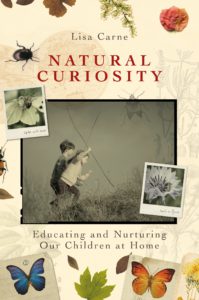 We spoke to Lisa Carne about her experience of moving her two children from mainstream schooling to home education, and learning through the lens of nature and natural history. Lisa is the author of Natural Curiosity, a warm and contemplative book that touches upon important themes in education and environmentalism, including children’s rights in schooling, the use and place of technology in learning and the absence of the natural world in mainstream education. It gives a considered, balanced view of home schooling interspersed with entertaining tales, and offers an understanding of how this type of education works and what inspires the choice to pursue it.
We spoke to Lisa Carne about her experience of moving her two children from mainstream schooling to home education, and learning through the lens of nature and natural history. Lisa is the author of Natural Curiosity, a warm and contemplative book that touches upon important themes in education and environmentalism, including children’s rights in schooling, the use and place of technology in learning and the absence of the natural world in mainstream education. It gives a considered, balanced view of home schooling interspersed with entertaining tales, and offers an understanding of how this type of education works and what inspires the choice to pursue it.
- What inspired you to write this book?
There have been three main inspirations, the first would have to be observing how my children learn in their natural environment at home, especially in our wildlife inhabited garden where they can greet Suffolk’s flora and fauna daily…
Which leads on to the second inspiration, our living environment with all the sounds, sights and smells this brings. When we were looking for a family home it came down to a choice of two, one larger property with a small garden and one much smaller property that looked as though it had been dropped rather carelessly into its fairly large plot, so much so that I felt inclined to pick it up and turn it. Anyway, we went for the latter, known affectionately as ‘Scribbler’s Drey’ and it was the right decision. Our children quickly made themselves at home in the garden and the house; from a very young age they were comfortable enough to sleep outdoors whenever they felt inclined and the habit stuck.
The third inspiration came from my research; I discovered how, for so many, early encounters with wildlife in their own homes and garden environments or through their travels led them to be very knowledgeable; their nature inspired learning led to fascinating nature filled lives.
- Why do you think it’s so important that children learn in the natural/outdoor environment?
Children simply love being outside, and there is no better environment for children to learn than one which they are enthusiastic about. I think we all instinctively know this but still need to prioritize it as a society. The natural world is something children bond with through their play and this should be acknowledged and respected every day in their mainstream school setting, as well as at home. I think we should be ensuring that this important need is being met.
- What factors do you feel are preventing children in mainstream schools from experiencing the outdoors?
I feel there are two main factors; the first is the current curriculum – it is too narrow, controlling and target driven.
The second is where natural history is ‘ranked’ in the curriculum; it’s not viewed as a priority subject and this is a major omission in my view. Allowing our children to learn through our most informative and common interest (the natural world) should be prioritized.
Currently though many school settings are often controlling, predictable and confining when it comes to learning. By placing trust in children to learn naturally and recognizing that their own interests do have a value will boost a child’s confidence. Uninhibited play and uninterrupted exploration are instinctive needs for mammals; with this in mind offering children access to an outdoor environment with all the sounds, sights and smells of the natural world to feed their curiosity would make their learning environment anything but limiting, confining or predictable.
- What have been some of the challenges of homeschooling?
For me, in truth, there has only been one challenge and that is how to set the scene for a magical Christmas when my children are at home with me all the time.
Luckily, Christmas is one of my favourite times of the year and I look forward to this challenge. My children do assure me that Christmas, and the build up to it, remains as exciting as it always has and this is a big relief!
- What is natural history and what is your favourite part about it?
I really like this question… for me, natural history is the discovery or the story so far, with intricate and scientific detail, of the flora and fauna that share our planet now or that once did.
It can also be the catalyst for igniting our natural curiosity. Having a fascination in natural history leads to endless questioning and a life long enthusiasm to gain knowledge.
My favourite part is simply being part of it.
- Any final thoughts?
There are species across our world that continue to put their offspring’s needs before anything else regardless of the havoc we wreak all around them. Their instinct to nurture appears unwavering.
This instinctive drive to protect and nurture is fascinating to observe and we (humans) still have much to learn when it comes to nurturing a child’s natural needs. I hope my own children’s learning experiences, described in my book Natural Curiosity can help to give an insight into what it’s like for a child to learn through nature and travel down the rewarding educational path it naturally provides.